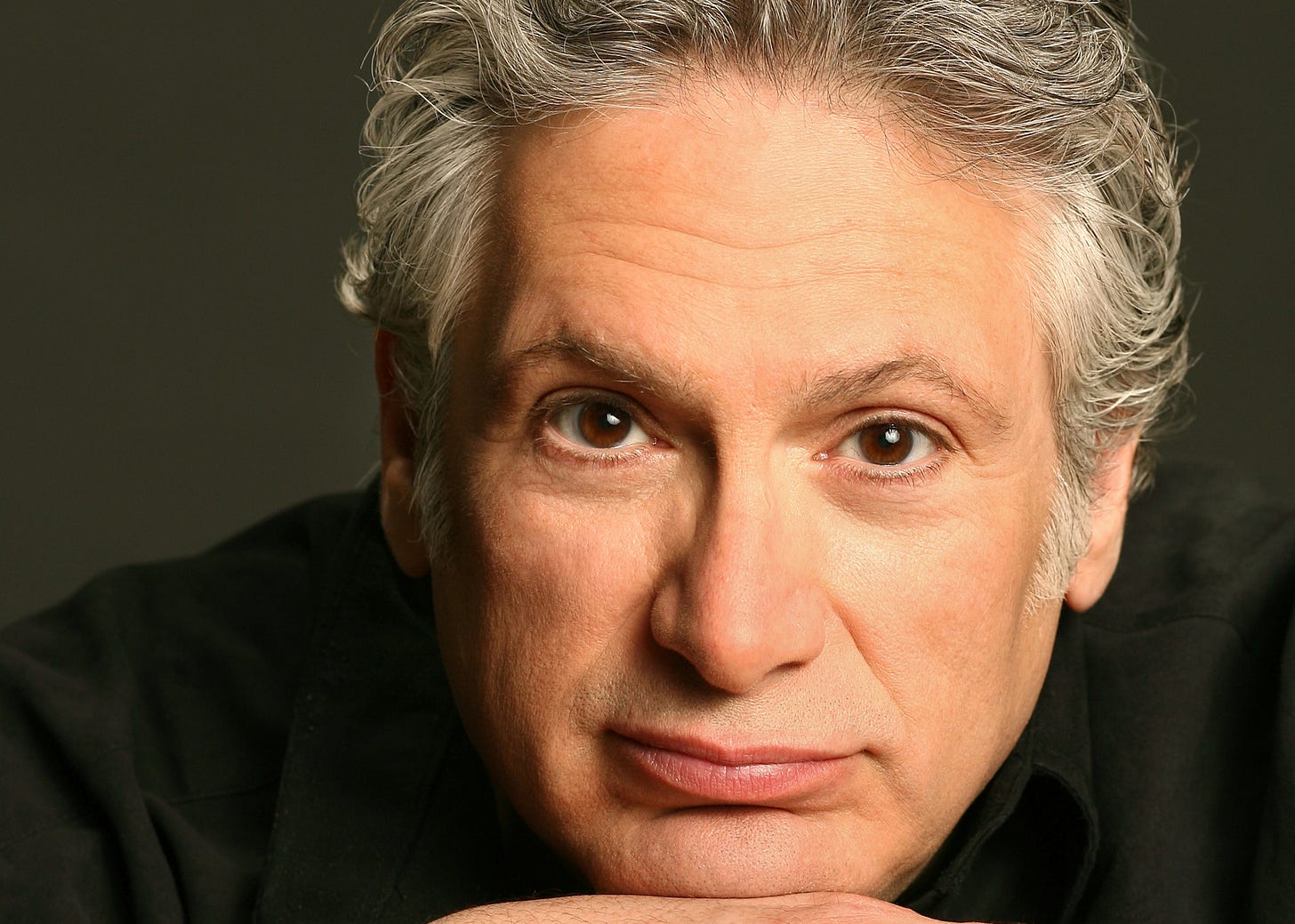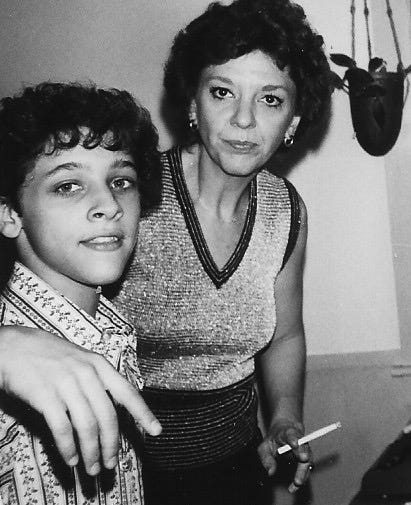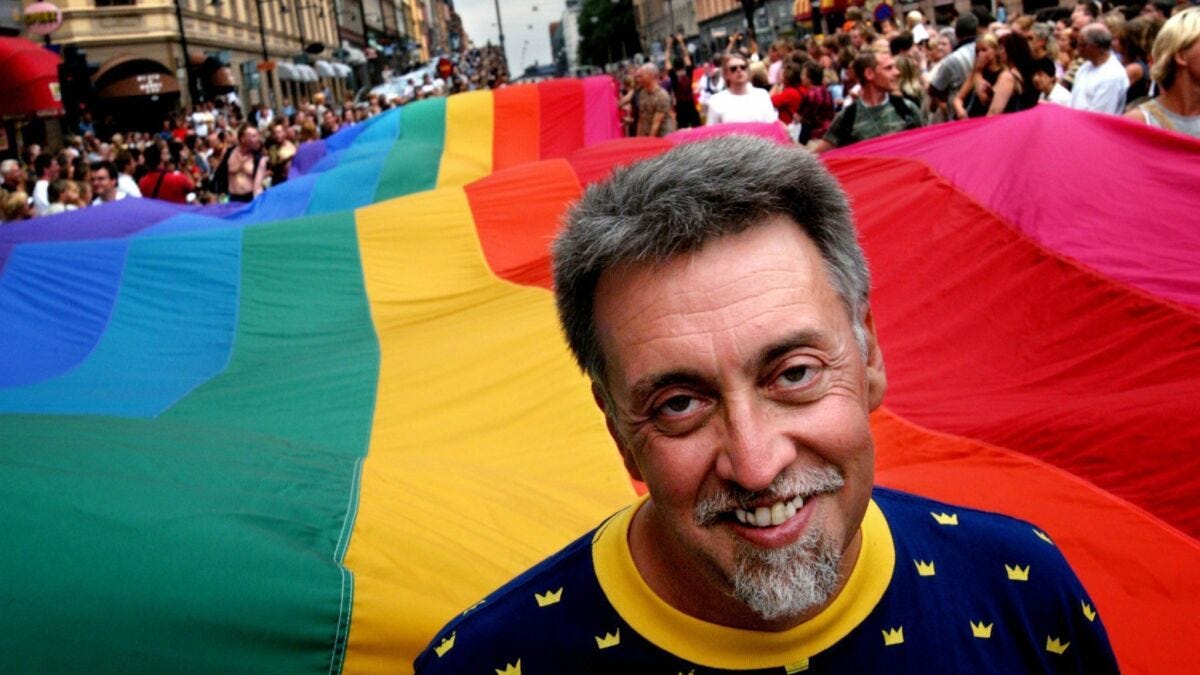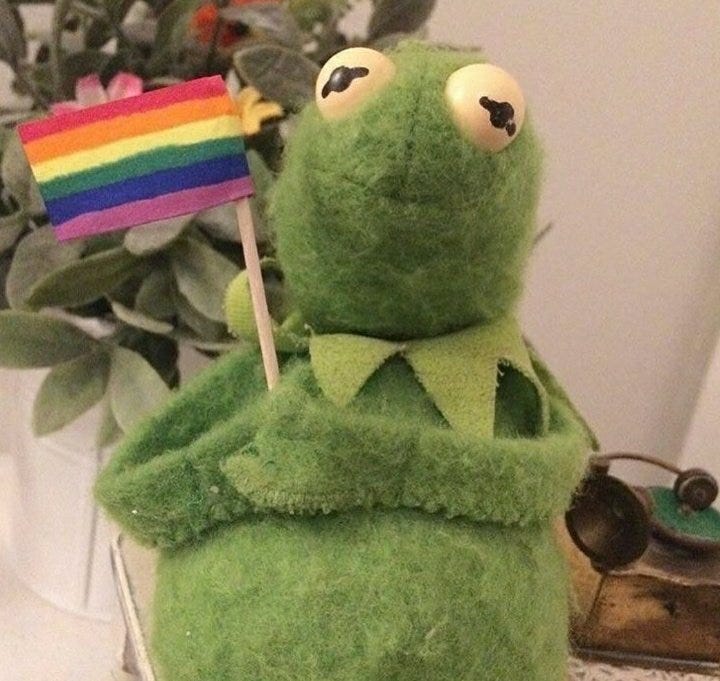Community Credulity
Pride, Expanding Acronyms, and Why the Rainbow's Not Enough
You never have to “fit in”
to know that you belong.— Mercedes Lucero
I recently had a stimulating chat with podcaster Melody Rachel, who asked me to share my experience of coming out in the ‘80s, during the worst of the AIDS epidemic. This led us to a more expansive conversation about gay history, and my nagging irritation with the way Pride has been complicated and coopted by a seemingly limitless cavalcade of categories and identity groups, resulting in an alphabet soup—the ever expanding acronym with more and more esoteric and discrete add-ons.
It’s fairly telling that the entire interview I did with Melody, as of this writing, has had a mere fifty-odd views on YouTube. But an excerpt she posted, captioned using something I said during the conversation, has had over two thousand views. The quote? “There’s no such thing as an LGBTQIA+ community.” Gasp. Provocative stuff, apparently. But I said it, and stand by it because while there has, for several decades, been a powerful movement for equal rights that’s united together the diverse groups of gay men, lesbians, transgender people, and others in a common cause—to say that we are a community—in the way I understand a community to be constituted and to operate, is a fallacy. It’s a beguiling idea, yes, to believe that we all accept and embrace and understand each other under this great big colorful tent. I truly believe that Pride, especially, should be an expression of our diversity, including our more outré and flamboyant elements. The whole point of Pride is to step out into the sunlight, living our truth, however that manifests, united in our right in this society to freedom of expression and the pursuit of happiness. I marched in parades and protests in the ‘80s and I was galvanized by the joyful, collective statement of the many faceted tribe that seemed manifest all around me, in which I had languished in the shadows for too long. All of us telling the world: we belong. We are here. We won’t be erased. Yes, that felt like community—or at least, communion. And it was a consummation devoutly to be wished.
So…when I made my rather daring statement in my chat with Melody, I was not referring to the movement, or minimizing the power we summon when we band together demanding human rights for all. What I was referring to is the idea of the “community” that certain activists use which takes an incredibly diverse population of myriad kinds of people, with varying challenges, needs, world views, cultural identities, sexual orientations and gender expressions—and declare that what unifies us is we are all oppressed. That this community is being killed and obliterated by…well, you know, everyone else. Except the allies, of course. I heard recently that there’s been an addition to the LGBTQIA: before the “+”—they’ve added another “A,” this one for the allies. You know, it’s always been one of the truly powerful components of Pride—and a huge part of the progress we’ve made—that supporters, parents, employers, corporations, churches, have organized and advocated and marched, encouraging understanding and compassion. But… I’m not keen on the term “allies,” because it suggests that we’re literally at war—that there’s an us and a them and the them is the same cruel force of destruction it ever was. That’s the credo of today’s Woke activism: define the oppressor. They achieve this by prescribing a lexicon of words, symbols, ideas and definitions which, when properly and frequently declared or displayed, signal to all that one is the right kind of person. The goal ostensibly is the showing of allegiance and support…of course, admirable. But—and call me a cynic—it often looks to me like the real goal is to obsess about rooting out the enemy.
I believe you cannot define a community of people in any useful or coherent way by directing most of your energy to shouting down dissent and defining who you’re NOT. This distortion suggests that one achieves power, influence or acceptance by forever affirming one’s powerlessness and victimhood. This may feel righteous in a sort of way, and maybe provide a sense of nobility in suffering, but really, you’re relentlessly arguing for your own impotence and dragging a whole bunch of other people to the big pity party with you. As a result of my personal lived experience as a proud gay man who endured decades of devastating discrimination and abuse for living out, I can categorically state that I never achieved a scintilla of empowerment by declaring myself a victim. When I marched on Washington and shouted “Silence=Death” and “We’re Here, We’re Queer, Get Used To It!,” bringing all my outrage and defiance to the fore, my intention was to blazon out the truth—not waste my hard won moment in the sun by giving the haters the satisfaction of informing them that I was the victim they believed I deserved to be.
There’s a saying that goes: “Resentment is like taking poison and waiting for the other person to die.” Yup.
Another quotation I recommend taking to heart, from one of the cultural gay warriors of all time, Harvey Fierstein: “Never allow yourself to be made a victim. Accept no one’s definition of your life; define yourself.”
For me this always meant: define who you are not by who you’re not, and not by forever repeating the story you’ve told yourself and others of how the cruelty of the ignorant and the hateful made you the victim you are today. My growing up was a daily endurance test. I had to leave for school every morning knowing that until I returned home at the end of the day and closed the door, I would be under constant assault, verbally, physically; in a perpetual state of vigilance and anxiety. I never had a chance to develop behaviors that might disguise the sensitive little sissy I was, and help me “pass,” like the many other gay kids I never knew were around me in those days, and who avoided me like I was radioactive. People ask when I came out…I tell them I was never in. I was small and vulnerable and effete and I couldn’t fight back. But I found my own way. Since I was already a target, I made myself a brighter one. I wore my own kind of clothes; I picked out my big mane of curls, when all around me kids had the same haircut (feathered); the same wardrobe (L.L.Bean standard preppy issue). I wore my dance shoes to school with leg warmers over my tight designer jeans. My mother was my champion. While she knew the inevitable price I’d pay for this self expression, she instilled in me a faith in my future, and the great things that awaited me beyond this temporary hell. She didn’t cluck over me and say, oh, poor you. She’d trumpet, “Jamie, you’re special! You’re one of a kind. Don’t let the bastards get you down! Someday, they’ll be sorry.” And she was right.
Were there, and are there, lasting scars from all the abuse, and behavioral patterns and triggers I’ve had to work through my whole life? Yes, but I never let anyone convince me that I was less than, and I affirmed that to be different in this world and to thrive, not just survive, one has to reinvest, constantly, with creativity and purpose, in the truth of who one is, and give no quarter and not one ounce of power to anyone trying to take that light away. I always saw the gay rights movement as an attestation of the special, brilliant vision queers bring to the world: in the things we create, in the risks that we take, in the examples we set—not just to each other—but to everyone. Examples of what is possible when we share the elation that comes from living as you know you are meant to live. It’s a kind of courage.
Courage is not “de-platforming” someone whose words you endow with the power to undermine your identity, or whose beliefs demonize you, or even deny your right to exist. You don’t actually silence them, and it’s a chicken sh*t move. Courage is not screaming down those who seek free inquiry and discourse about controversial subjects, and who may not fully agree with or endorse everything, or anything you believe in or stand for. Screaming? That’s cowardice and childishness. If you know who you are, and you believe in your inalienable right to be that, then it’s not only possible to listen to another point of view, or take in a talk by a controversial speaker you oppose—it’s your responsibility. And if you come prepared for the debate, it can be a pleasure. Because by engaging in the Q&A, or seeing through a challenging debate, you might find a way to illuminate that other person’s understanding; hell, you may earn their respect and admiration for your clarity, your openness and your conviction. And you know, if you feel that you’re called to get out there and fight for the rights of those you believe are being wronged, there’s nothing more noble. However, the work of persuasion takes much more thought, and study, and time, and awareness, and yes—generosity. This is the Gay Super Power in my view: the power to be brave enough to show people that what they express as hate is no more than their own fear—not even fear of you. Although they do fear you, because they don’t understand you, they fear more losing their sense of themselves and the safety of the narrow world they’ve built around them that supports that sense of self. They see your courage—the courage to be different—and it scares the hell out of them.
I often say to young folks who I observe are not reaching beyond their algorithm enough toward the unknown and unfamiliar: ignorance is an explanation, it’s not an excuse. If you shout down anything that might require some willingness to step out of your rigid ideological box, you are no better than the bigots and bullies you rail against. And if you think there’s some righteousness in stubbornly demanding that they compromise, that they be made to give up their privilege, that they be made to cower, and take some of the abuse their kind have dished out for so long… well, then your trials, and struggles, your very survival, have taught you nothing. If you think you’re dishing out the bile on behalf of the voiceless or oppressed, no matter how sincere you are, you are doing the exact opposite of what you intend. You’re affirming their victimhood; their need to be saved and defended. You reward them for being triggered and fragile; you coddle them, and send them home early to process their trauma. You unwittingly affirm the kind of story about themselves that, if I had believed in as a child, would have made everything I’ve achieved, and all the inspiration and encouragement I’ve brought to people’s lives through my example, utterly impossible. And then the bullies would have won.
I will tell you, if I may, how I think you might achieve something close to the ideal I suspect you’re reaching for with the term community.
Stop being anti things. Start being for something. Stop tearing things down and scheming and plotting to cancel your detractors. Start making things. Bridge the divide between your truth, and their fear/hatred, by showing them how much we all share in common… but also, how fucking fabulous you are, simply being brave enough to wear your truth, to be it, show it, state it, as if there isn’t a no in the world. You know, you may just transform someone’s life and bring them into communion, and possibly, community with you. And kids, if you scoff at that as saccharin, old fashioned sentiment from some out of touch gay white privileged male, well, then you deserve the “community” you’re making. But man, us old gays sure would love to see you happy…not necessarily grateful; that will, I think, come with the humility and perspective life brings to you—but at least celebrate the previously unimaginable rights, the privileges, the freedoms and the ever-expanding, ever more visible special beauty you are able to bring to the world!
Our efforts helped you along, and those of queers far braver, more daring, more oppressed; the fallen, the forgotten and the fearlessly fabulous that came before all of us, and on whose over-padded, sequined shoulders we stand today. Honor them by reading them, by watching them, by experiencing their music, the fashions they invented, that you don’t even know you’re borrowing from them. Listen to the words… not just of defiance; the unflagging enthusiasm and optimism of Harvey Milk or Harvey Fierstein; E.M. Forster and Quentin Crisp. Do homage to them. Or, what the hell!—steal from the best, and wear it like a suit of new clothes all your own!
If you know who you are, no one can misgender you. If you know who you are, no one can make you feel unsafe if they fail to parrot all the rituals that are meant to signal that you’re welcome. Here’s a thought…how about assuming you’re welcome? Maybe try making other people welcome; I bet they will respond in kind. You know, Emily Post, the author of Etiquette, and the authority from a distant time on all things good manners, said, “Good manners are there to put others at their ease.” Why not lead the way? It takes so little effort—certainly less effort than scrutinizing new acquaintances for signs of oppression. Many of you want safe spaces, but you walk into every space looking for hatred and bigotry and micro-aggressions or whatever. You become undone if you find yourself in a room where you’re outnumbered by those not exactly like you. Guess what? There’s no one like you in all the world.
Sure, it’s nice to feel that everyone is accepting and non-judgmental, and sometimes yeah—it’s awesome to have some kindred queers in the mix to eyeroll with and share an understanding, or a brand of humor uniquely queer. But you know? Your gayness, your gender identity, your choice of clothes, your hair color, your pronouns? They’re not—and I guarantee this—the most interesting, the most dazzling, the most moving and memorable things about you. By all means, you do you!—wear it, dye it, pierce it, slay it! Just check to see if all that carefully curated rebellion and utopian new world identity you put on in the morning…just make sure you’re not hiding behind it. Or wearing it like a dare; a balled up fist to keep people from getting close enough to really see you…because whether we like it or not, no matter how hard we try to create division, to define the “other” and to fight hierarchies with new hierarchies—we know, in the place where we all truly know things, that we’re really all the same.
Remember the Tower of Babel? Humans came together and united in their determination to build a glorious city whose towers would reach to heaven. God, always ready to let humankind know their place, fractured their one unifying language into hundreds of disparate tongues, creating confusion, disunity, and the ruin of their grand communal project. As an actor and an artist, and a student of the world, I believe there is a unifying language we all understand innately—in that deep part of us that understands: the language of shared and universal human experiences. Oh, don’t get me wrong—one of the miracles of life is that there’s never been, and never again will be, another person in all space or time like each of us. No one can see the world, interpret it, inhabit it the way each of us does. No one can really know what it’s like to live life as another lives it. But we’re each kidding ourselves if we believe that our journey, our struggles, our trials, our sense of belonging or being shut out, the injustices we endure, and the richness of the varied cultures we inhabit are so utterly unique, so incomprehensible, that no one could ever understand or imagine our lived experiences, and it’s an insult if they try!
Oh, please. Get over yourself. We all share the same essential human experiences and passages of life. Every single one. The inevitable, predestinate, eternally shared human experiences. As an artist, I refuse to believe that I can’t have any insight into what it might be like to inhabit the life of someone from another race, or culture or gender. I can imagine it, and my work depends on it! I reject the idea being perpetrated by so-called social justice warriors (who are so often antisocial and unjust) that to try and relate something from one’s own experience, seeking a connection to something being shared by another, very different person from their experience, should be condemned as equivocation. What a vile idea. That I might somehow invalidate or trivialize someone else’s pain or struggle by relating to it through my own. What about that rare, illuminating miracle that can occur when two very different humans find a way to catch a glimpse inside each other’s souls, and see themselves mirrored back.
So. It’s Memorial Day Weekend. Let’s remember and honor those who gave everything so we can live as we do. And as Pride Month begins, I appeal to all my queer brothers, sisters, and others: be joyful and be happy, and fuck yeah!—drag anyone and everyone from the sidelines into the parade with you. Let’s not be so damned fussy and precious, and remember: the rainbow flag meant, and means, every color there is, right? Then let’s include everyone, even if they don’t rate a special stripe or symbol or a flag entirely of their own. When did the rainbow cease to be enough?
Harvey Milk, when he conceived and commissioned the very first Pride flag, meant it to be a symbol of hope. Up to that moment, the gay rights movement had taken up the symbol of the pink triangle—the emblem used to mark gay people for destruction by the Nazis—and transmuted it into a symbol of remembrance and the determination to defeat persecution. But it was still a terrifying reminder, for many, of the horrors of the Holocaust. Harvey gave a young idealistic gay activist named Gilbert Baker the charge of designing a new flag for this new and hopeful movement. Baker hand dyed and stitched together a huge flag of rainbow stripes. It might help those who think the flag needed altering or augmenting, or that as many as thirty-two new Pride flags (good grief) were required in order to include all the many racial and individual identity groups within the movement. I dunno. The rainbow always meant all the colors, all the shades, to me.
Gilbert’s eight strips of brilliant color contained these meanings: hot pink stood for Sexuality, red for Life, orange for Healing, yellow for the Sun, green for Nature, turquoise blue for Art, indigo for Harmony and Violet for spirit.
Wow. Not one mention of a specific identity or racial group; no mention at all of gay people, even! It seems to me, what Gilbert wanted to affirm were the eternal, beautiful, life giving, life changing universal experiences and shared human essentials that bind all people together. The hope that Harvey Milk wanted him to embody in the flag was the hope that with work and courage and time, gay, lesbian, trans, queer, all the people who were excluded from the human story, might walk hand in hand with all other humans under one banner. He was preaching love, understanding, humanity. He believed in the basic goodness of people. And he loved being gay. Of course, tragically, Harvey Milk, like Dr. Martin Luther King, Jr., who also preached love, was gunned down, senselessly, by fear and ignorance and hatred. But I bet, if I could contact him across the divide, he’d say, aw, you guys—the rainbow is enough!
We all belong. That’s the message. It’s not as complicated or as political as all these newfangled banners, that make sure there’s a strip for these folks and a symbol for those folks… and the rainbow doesn’t look quite as sophisticated and fancy without the newfangled chevrons and special symbols. The rainbow flag is for Hope. It’s for all humanity. That’s not as much fun as throwing a big party and writing up a long list of who’s not invited, I guess. Or getting crafty and making up special team colors for all the special people. But it sure is pretty.
Who said that every wish would be heard and answered
When wished on the morning star?
Somebody thought of that, and someone believed it
Look what it’s done so far
What’s so amazing that keeps us stargazing?
And what do we think we might see?
Someday we’ll find it, the Rainbow Connection
The lovers, the dreamers, and me…
~Paul Williams/Kenneth Ascher, “The Rainbow Connection”








Wow! Beautiful and inspiring - thank you for writing this.
You're a beautiful cat, Jamie!